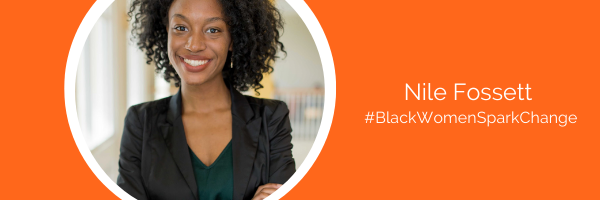
Nile Fossett is the Diversity, Equity and Inclusion Outreach Specialist with Girls Who Code, an international nonprofit working to close the gender gap in tech. Nile is also studying ICT and Data for Development (the intersection of data science and public policy) as an MPA-DP candidate at the Columbia University School of International and Public Affairs.
Her natural passion for connecting with others led Nile to start her career journey with a communications degree from the University of Maryland. When it came time to make her next move, she looked to her mom for inspiration.
“She runs a nonprofit that’s based in Maryland, and it’s actually named after me,” Nile shares. “My whole life I’ve just seen her give back to people.” Her mom, Saran Fossett, runs a Maryland-based nonprofit called AZIZA PE&CE, which primarily serves girls and LGBTQ+ youth ages 12 to 24.
Drawing from her mom’s example, when Nile moved to New York to pursue her path in STEM at Columbia, she decided to pursue a position with Girls Who Code.
“I always knew whatever I did, I wanted to do it for good,” Nile explains, adding that “a lot of that comes from my mother.”
But her mom’s generous spirit was just one of the factors that influenced Nile’s path. Seeing her mom’s ambition reflected in her many career changes – from a professional model to an education professional to a nonprofit leader – encouraged Nile to chase her own dreams.
“Just to see how many lives my mother has lived, it’s inspired me to kind of just pursue whatever interests me,” Nile shares.
The role with Girls Who Code gives Nile the unique opportunity to follow her mother’s example and combine her passion for communication with her desire to give back to other women in her community who also wanted to pursue careers in STEM.
“It’s been really awesome to work here and be able to do that communications work but also to see my two worlds collide,” Nile adds.
Getting Out of Her Own Way
As a young adult Nile struggled with imposter syndrome.
“For women, especially women of color, that’s a big thing,” she says. “I realized as I got older, when I was 20, 21, 22, I was the one second-guessing myself. I was getting in my own way.”
Graduating during the height of the pandemic helped Nile shed some of the imposter syndrome she experienced in school.
“Having nothing but time and space just to think about things during the craziest time of all of our lives,” she says, “made me realize that I have to just do things.”
Overcoming imposter syndrome has been a work in progress but learning to trust herself has made her more confident in her post-graduate career. When she finds herself comparing herself to other students in her classes and when pursuing opportunities, she reminds herself she’s exactly where she was meant to be.
“I think I’m still overcoming, because, at every level, you’re going to face more challenges, but also, if I wasn’t being challenged, then it wouldn’t be a place for me either.” Nile adds.
Supporting the Next Generation
Driven by her mom’s example, and her own experience managing imposter syndrome, Nile feels motivated to support the women coming up behind her.
“When you’re doing things, you’re doing them for you, but you’re also doing them for the generations after,” she shares.
And as she strives to make a difference, she thinks about all of the opportunities that were made possible for her by her grandmothers, mother and other strong women throughout history.
“There are so many doors that are open for us in this generation that did not exist in the generations before us. And those doors are open so that we can go through them,” she adds.
Ultimately, Nile’s work allows her to build on the work of previous generations. Now, she is helping to open more doors and make the tech space more accessible for a new generation of women.
“In the future, you’ll see the difference when products and things are designed,” Nile says proudly. “And it makes a difference that Girls Who Code is influencing that.”
